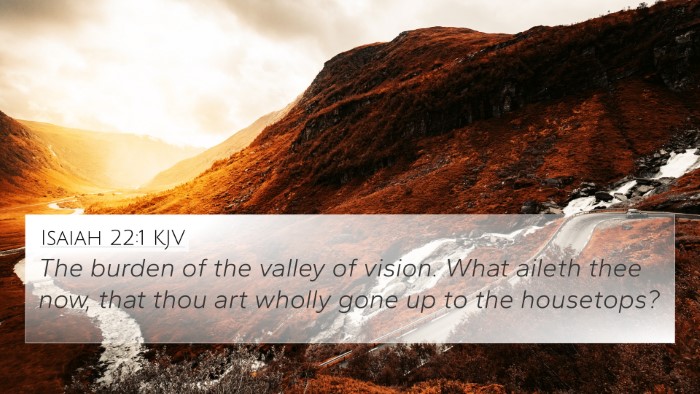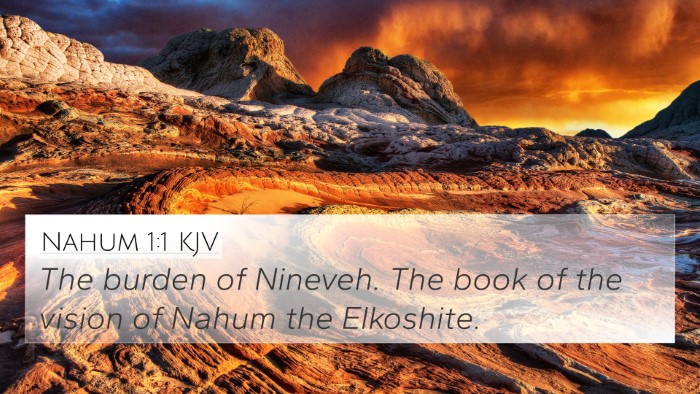Old Testament
Genesis Exodus Leviticus Numbers Deuteronomy Joshua Judges Ruth 1 Samuel 2 Samuel 1 Kings 2 Kings 1 Chronicles 2 Chronicles Ezra Nehemiah Esther Job Psalms Proverbs Ecclesiastes Song of Solomon Isaiah Jeremiah Lamentations Ezekiel Daniel Hosea Joel Amos Obadiah Jonah Micah Nahum Habakkuk Zephaniah Haggai Zechariah MalachiHabakkuk 1:1 Similar Verses
Habakkuk 1:1 Cross References
The burden which Habakkuk the prophet did see.
Uncover the Rich Themes and Topics of This Bible Verse
Listed below are the Bible themes associated with Habakkuk 1:1. We invite you to explore each theme to gain deeper insights into the Scriptures.
Habakkuk 1:1 Cross Reference Verses
This section features a detailed cross-reference designed to enrich your understanding of the Scriptures. Below, you will find carefully selected verses that echo the themes and teachings related to Habakkuk 1:1 KJV. Click on any image to explore detailed analyses of related Bible verses and uncover deeper theological insights.

Isaiah 22:1 (KJV) »
The burden of the valley of vision. What aileth thee now, that thou art wholly gone up to the housetops?
Habakkuk 1:1 Verse Analysis and Similar Verses
Understanding Habakkuk 1:1
Habakkuk 1:1 reads: “The burden which Habakkuk the prophet did see.” This verse introduces the Book of Habakkuk, outlining the prophet’s profound concerns regarding the state of his nation and God’s apparent silence in the face of injustice.
Context and Overview
The book of Habakkuk is distinct among the minor prophets for its dialogue between the prophet and God. In this opening statement, we see Habakkuk expressing a significant burden—a divine message that’s heavy with concern over the spiritual and moral condition of Judah during a time of impending judgment.
This verse sets the tone for the entire book, establishing Habakkuk’s role not just as a messenger but also as a concerned observer wrestling with divine justice.
Commentary Insights
Matthew Henry’s Commentary
Matthew Henry notes the phrase “the burden” signifies the serious weight of the message that Habakkuk bears. This indicates the sorrowful and distressing nature of the visions he will receive. He emphasizes the prophetic role of Habakkuk in revealing God’s plans and frustrations about the evils witnessed in society.
Albert Barnes’ Commentary
Albert Barnes elaborates that the word “burden” refers not just to a physical weight but to a prophetic revelation that implies both urgency and seriousness. Barnes highlights that Habakkuk ultimately questions God about justice, showing his role as a mediator with divine insight and human despair.
Adam Clarke’s Commentary
Adam Clarke supports the view that Habakkuk’s vision is a revelation of future events. Clarke points out that the prophetic burden signifies the struggles of the faithful during trying times and prepares the reader for the subsequent dialogue on justice and suffering within the text.
Thematic Bible Verse Connections
Habakkuk 1:1 connects with numerous other scripture passages that explore themes of suffering, justice, and divine communication:
- Psalm 73:2-3: Expresses the struggle of the righteous as they observe the prosperity of the wicked.
- Isaiah 5:20: A warning against calling evil good, reflecting the moral failures that burden Habakkuk.
- Jeremiah 12:1-4: Similar questioning of God about justice amidst evil.
- James 5:7-8: Encouragement for believers to be patient in the face of suffering.
- 2 Peter 3:9: Discusses God's patience and the timing of judgment.
- Matthew 21:12-13: Jesus’ cleansing of the temple, symbolizing divine frustration with injustice.
- Revelation 6:10: The cry of the martyrs for justice resonates with Habakkuk's burden.
Links Between Prophetic Teachings
The connections between Habakkuk and other scripts deepen our understanding of God's intent and the human struggle. For instance, the dialogue in Habakkuk offers rich insights in light of the messages found in Isaiah and Jeremiah, who also ponder over the justice of God in the face of societal wrongdoing.
Inter-Biblical Dialogue
The burden of Habakkuk leads believers to consider how God's justice unfolds. This verse and the subsequent conversations in the book serve as a bridge between the struggles of the ancient prophets and contemporary faith challenges.
Conclusion
Habakkuk 1:1 invites readers to reflect on the weight of divine messages amid life's complexities. Understanding this verse in conjunction with other biblical texts enhances our grasp of God's ongoing dialogue with humanity about justice, suffering, and hope.
Further Study Tools
For those interested in deeper exploration, various Bible reference resources can help readers uncover these Bible verse cross-references. Utilizing a Bible concordance, one can follow thematic Bible verse connections, allowing for a richer understanding of how various scriptures inform and echo each other.



